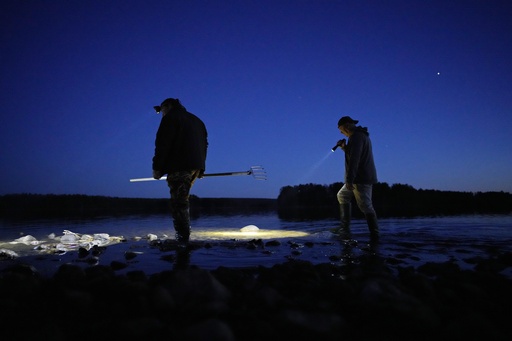In the serene setting of northern Wisconsin’s Chippewa Flowage, John Baker prepares for a traditional Ojibwe spearfishing outing. Reflecting on the area’s history, Baker mentions how the construction of the Winter Dam in the 1920s flooded ancestral lands and disrupted the lives of many Ojibwe people. Despite this history of displacement and violence, Ojibwe and other Indigenous communities in the Upper Midwest persevere in protecting their cultural practices like spearfishing, hunting, and wild rice harvesting against new threats such as climate change and development along lakeshores.
Brian Bisonette, conservation director of the Lac Courte Oreilles Conservation Department, emphasizes the importance of honoring ancestors by safeguarding these traditions. Tribal communities have faced challenges as the U.S. government failed to uphold promises made in treaties signed in the 18th and 19th centuries, leading to restrictions on hunting and fishing activities for Indigenous peoples. However, through legal battles and activism, Ojibwe treaty rights were reaffirmed by the Supreme Court in 1983, granting tribal members the ability to continue their traditional practices.
Despite legal victories, Indigenous communities have encountered backlash and racism from some non-Indigenous locals. These tensions underscore deeper-rooted issues of racial discrimination and a lack of understanding. Through the lens of history, Indigenous communities advocate for environmental stewardship and the preservation of cultural values. By revisiting ancestral treaties and ecological knowledge, Indigenous peoples strive to find sustainable solutions that respect the land and its resources, contrasting with a mainstream mindset focused on exploiting natural assets.
The legacy of preserving ancestral wisdom for future generations underscores the holistic approach Indigenous communities take towards environmental issues. By rejecting a monetary value system imposed on natural resources, Indigenous peoples prioritize the intrinsic cultural and spiritual significance of the land. The ongoing efforts by Indigenous groups to protect their traditions and the environment reflect a broader commitment to sustainability and respect for the land.


